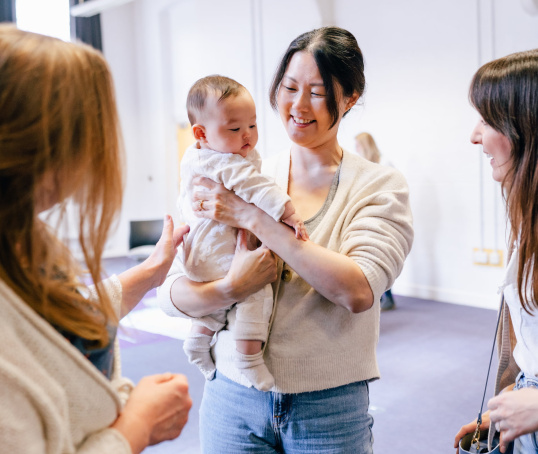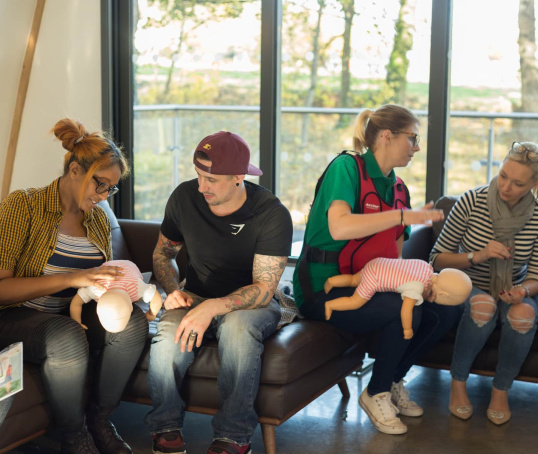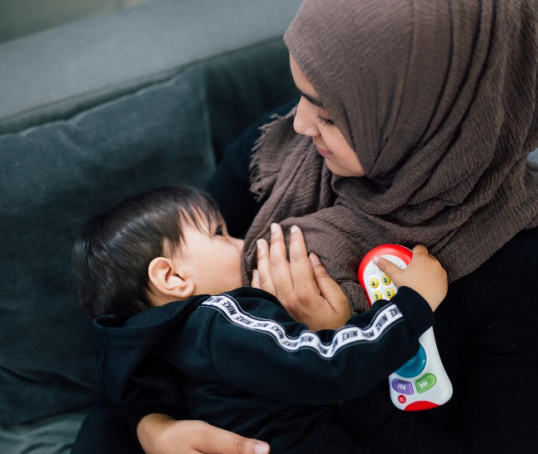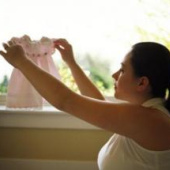It’s devastating when a baby dies. Here we explain what stillbirth is and what you can do to reduce the chance of it happening. We have a separate article on experiencing a stillbirth.
What is stillbirth?
A stillbirth is the death of a baby after 24 completed weeks of pregnancy, before or during birth. If a baby dies before 24 completed weeks, it’s called a miscarriage (NHS, 2021a).
The stillbirth rate was 3.54 per 1,000 total births in 2021 for the UK (Draper et al, 2023). The UK Government has a national ambition to reduce stillbirth and neonatal death (Nuffield Trust, 2023).
What do we know?
Some stillbirths may be linked to complications with the placenta, a birth defect or the mother's health. For others, it can be hard to identify the cause of death. The charity Sands (Stillbirth and Neonatal death) have more information in their article ‘Understanding why your baby died’.
Several factors are associated with the risk of stillbirth, but many of these – like age or ethnicity – are outside the pregnant woman’s control, while others are routinely screened for at antenatal appointments (NHS, 2021b).
What can I do to reduce the chance of stillbirth?
Things that the NHS suggest could lower the chance of stillbirth include:
- Avoid or reduce smoking
- Avoid or reduce alcohol and recreational drugs
- Attend antenatal appointments so your midwife can monitor the wellbeing of you and your baby
- Tell your midwife about any medical conditions you have so they can be managed. Tell them about tummy pain or vaginal bleeding on the same day. Tell them about any itching.
- Protect yourself against infection by keeping up to date with flu, Covid, and other vaccinations
- Protect yourself and your baby from other infections by washing your hands, asking anyone who may be infectious to wear a mask to protect you, and ensuring your food is well cooked
- Tune into your baby’s movements and tell your midwife the same day about any changes you notice (RCOG, 2019).
- Go to sleep on your side rather than your back.
- Limit the amount of caffeine you consume during pregnancy to 200mg a day – two cups of instant coffee (Heazell et al, 2020; RCOG, 2022).
- Healthy eating and exercise could reduce risks associated with obesity (NHS, 2021c).
Given the disproportionate effect of ethnicity and deprivation on stillbirth you may also want to:
- Ask your midwife about culturally competent care. If not confident in the response, contact the senior midwifery team at your hospital.
- Seek culturally competent care from a doula.
- Make use of the Five X More Six Steps as recommended by the MBRRACE-UK report ‘Saving lives, improving mothers’ care’ (Knight et al, 2023).
This page was last reviewed in April 2024.
Further information
Find out more about stillbirth: NHS Stillbirth
Our article on experiencing a stillbirth provides further support and information.
If you are anxious about stillbirth or struggling with your mental health:
- NCT perinatal mental health hub
- Maternal Mental Health Alliance
- Tommy’s helpline for Black and Black Mixed-Heritage women
- Sands also offers guidance on safer pregnancy
Draper ES, Gallimore ID, Smith LK, Matthews RJ, Fenton AC, Kurinczuk JJ, Smith PW, Manktelow BN, on behalf of the MBRRACE-UK Collaboration. (2023) MBRRACE-UK Perinatal Mortality Surveillance, UK Perinatal Deaths for Births from January to December 2021: State of the Nation Report. Leicester: The Infant Mortality and Morbidity Studies, Department of Population Health Sciences, University of Leicester. Available at: https://timms.le.ac.uk/mbrrace-uk-perinatal-mortality/surveillance/#perinatal-mortality-in-the-uk [Accessed 28 Feb 24]
Heazell A, Li M, Budd J, Thompson J, Stacey T, Cronin R, et al. (2018) Association between maternal sleep practices and late stillbirth–findings from a stillbirth case‐control study. BJOG. 125(2):254-262. Available at: https://doi.org/10.1111/1471-0528.14967
Heazell A, Timss K, Scott R, Rockliffe L, Budd J, Li M, et al. (2020) Associations between consumption of coffee and caffeinated soft drinks and late stillbirth—Findings from the Midland and North of England stillbirth case-control study. Eur J Obstet Gynecol Reprod Biol. 256:471-477. Available at: https:doi.org/10.1016/j.ejogrb.2020.10.012
Knight M, Bunch K, Felker A, Patel R, Kotnis R, Kenyon S, Kurinczuk JJ (Eds.) on behalf of MBRRACE-UK. Saving Lives, Improving Mothers’ Care Core Report - Lessons learned to inform maternity care from the UK and Ireland Confidential Enquiries into Maternal Deaths and Morbidity 2019-21. Oxford: National Perinatal Epidemiology Unit, University of Oxford 2023. Available from: https://www.npeu.ox.ac.uk/mbrrace-uk/reports [Accessed 28 Feb 24]
NHS. (2021a) Stillbirth. Available at: https://www.nhs.uk/conditions/stillbirth/ [Accessed 28 Feb 24]
NHS. (2021b) Stillbirth: Causes. Available at: https://www.nhs.uk/conditions/stillbirth/causes/ [Accessed 28 Feb 24]
NHS. (2021c) Stillbirth: prevention. https://www.nhs.uk/conditions/stillbirth/prevention/ [Accessed 28 Feb 24]
Nuffield Trust (2023) Stillbirths and neonatal and infant mortality. https://www.nuffieldtrust.org.uk/resource/infant-and-neonatal-mortality [Accessed 9 Feb 24]
RCOG. (2019) Your baby’s movements in pregnancy. Available at: https://www.rcog.org.uk/en/patients/patient-leaflets/your-babys-movemen… [Accessed 28 Feb 24]
RCOG. (2022) Healthy eating and vitamin supplements in pregnancy. Available at: https://www.rcog.org.uk/en/patients/patient-leaflets/healthy-eating-and… [Accessed 28 Feb 24]






